
by Michael | Jul 14, 2015 | Blog
In my experience, most couples – especially the men! – don’t really know what can go into their wedding service. There are exceptions, of course, but most people have enough trouble accepting that there are alternatives to either a full religious church service or the somewhat sterile register office ceremony.
Creative ceremonies are very much a possibility, and all you actually need to ensure is that the legal formalities are catered for.
What do I mean by “creative”? Well, how long is a piece of string?
To begin with, do you plan to hold the ceremony indoors or out? How conventional do you want it? Do you want it under the sea? In a plane? Up a mountain? In a back garden? They’re all possible.
To speak fairly generally, you can hold a fairly traditional ceremony that, to all intents and purposes, looks like the wedding my grandparents would have expected (except that it might not be held in a religious edifice).
You may opt for a pagan ceremony. A handfasting will invoke nature blessings and can be most exciting.
Then there are various gradations of religiosity. You could have a few prayers and blessings, some originating from other liturgies or cultures, and of course it might be a humanist-type wedding, with no religious words at all.
A Civil Celebrant-led wedding can cover any degree of religiousness, but your choices don’t end there. There’s the language to be used (by that I mean formal or informal), there’s the music to be decided, what readings or poems will be used, and, indeed, whether you want friends or family participating.
Perhaps the element that differentiates weddings the most is the choice of ritual. I’d like to speak about this more next week, but just a few pointers as to what I am driving at.
Depending on personal beliefs and preferences, you can include rituals from your own or other religions. An East European ritual, for example, involves the couple being presented (usually by a mother) with a loaf of bread. They both bite into it simultaneously, and the person who gets more will supposedly be the head of the household!
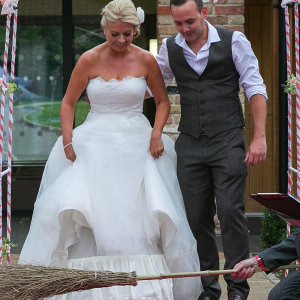
One of my favourite rituals normally comes at the end of the ceremony, is pagan, and can bring a smile to everyone’s face. It’s called “jumping the broom”, and the couple have to jump together over a besom. This symbolises sweeping out the old and bringing in the new, as they start their life together.
Some more suggestions will follow next week, but if you can’t wait till then, feel free to contact me!
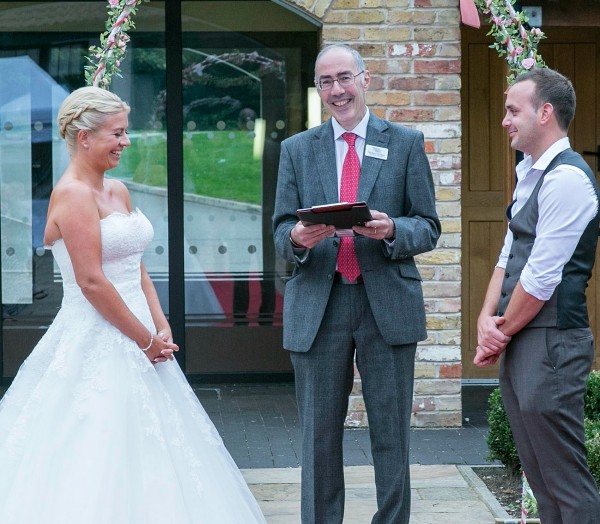
by Michael | Jul 7, 2015 | Blog
I do appreciate that not everyone understands what I offer. Although there have been civil celebrants in this country for more than fifteen years to my knowledge, there is still widespread ignorance about our role and the benefits that we can provide.
To clarify things, I’d like to focus on three ceremonies I created and performed in the not-too-distant past. I’d like to think that these will shed light on what is on offer and even give you some food for thought.
Handfasting
Imagine holding an open-air wedding ceremony on an Iron Age hill-top fort!
That’s what Annie and Ross organised. They were an interesting pairing: she was pagan and he was half-Jewish. They asked me to put together a ceremony that would reflect both religions. A challenge I enjoyed rising to!
As soon as they had done the legal bit in Salisbury Register Office they, and their entourage, headed up the hill to where I, in my robes, and my table was awaiting them.

After a welcome, explanations were offered before each ritual.
The Jewish part involved the bride circling the groom seven times while he read out certain traditional statements (in English) about a “woman of valour”. He also broke a glass underfoot at the end to the traditional cries of “Mazal tov!”.
The pagan parts included charging the circle, summoning the elements of nature, drawing down the God and Goddess, reciting handfasting vows, and drinking from the Loving Cup.
A very special occasion.
Canalside Vow Renewal
Another happy outdoor ceremony took place at Basingstoke Canal Centre.
C. and S. were celebrating 25 years of marriage and had invited friends and family to their beloved canalside location. It was hot and humid – indeed, it cannot be claimed that we remained totally dry, but nobody minded.
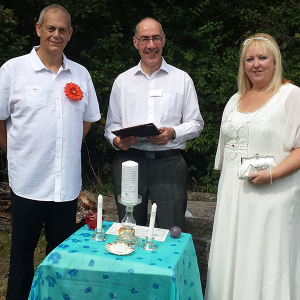
We convened in a grove with benches arranged in a semi-circle. I brought a table and unity candle and off we went. One highlight was the personal celebrant address, which touched on some of the events – happy and a few sad – over the thirty years the couple had known each other. Some favourite songs were played. A simple, cheerful, yet moving ceremony was the outcome.
Wedding Blessing
A completely different setting was the prestigious British Medical Association House in the heart of London. The couple had requested the legal ceremony (with the registrars) before my turn came to bless them. In contrast to the formality of the first part, this was more relaxed and although some beautiful, memorable words were spoken, smiles and even laughter were an integral part of the proceedings (even before the wine in the Loving Cup was shared!) and all went away to the reception more than satisfied with the formalities.
I hope this gives a flavour of the variety of ceremony that a Civil Celebrant can offer. I would certainly be happy to answer any questions this article may give rise to.
by Michael | Jun 30, 2015 | Blog
A Muslim marrying a Jewess – that doesn’t happen every day!
Tempting as it is to devote this blog to a discussion of inter-racial or inter-religious harmony, that’s not really my subject, wonderful as it might be.
Mixed marriages are more up my professional street, though.
Be that as it may, I was delighted to contribute (in a tiny way) to this utopian ideal by conducting a wedding blessing very recently at a mixed marriage. It was, indeed, the union of Muslim and Jewess.
Neither one of the couple was religious, in fact. The Muslim wanted no part in any religious ceremony (although he did agree to participate in our blessing, as long as he didn’t have to say anything); the Jewess agreed to it mostly to satisfy her parents.
I had worked with M.’s mother (although M. was given the opportunity to ask for amendments etc.) to create a suitable blessing ceremony. Essentially, it would consist of a number of blessings in English (a few in Hebrew), the traditional “Seven Blessings” in both languages, and some wine. Thus, a mix of traditional and modern.
On the day, I sought out the groom, who, not unreasonably, was a bit nervous about the whole event, and put him at ease. We had a chat, and I told him what was going to happen, and that he didn’t need to worry about anything.
After the legal marriage (which took place in the same hall), I took over. I threw in a couple of impromptu little jokes at the start, so the couple could feel more comfortable, and made a few guests smile with my introductory remarks.
I then went through the blessings, as agreed, but what was nice was how the groom visibly relaxed – even to the extent of cracking a joke himself when it came to the wine!
The blessing ceremony only lasted 10 minutes, at most, but it was obviously appreciated and I felt very pleased, though humble too, because of the role I had been able to play in the union of two lovely people of potentially clashing cultures.
May they be a beacon for others – and may they find true happiness!
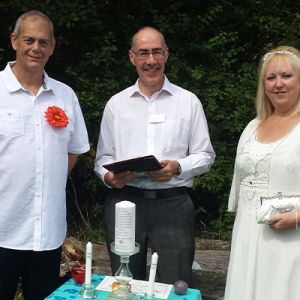
by Michael | Jun 23, 2015 | Blog
They say that you have to work at most things, but especially at marriage. If you doubt that, just look at the divorce rate. Many people believe that, once their marriage is ‘established’ – perhaps ten years old – there’s no more need to work at it.
Wrong!
Of course, you may have a freak marriage, where relationships are almost always smooth and harmonious, but reality tells us that that is almost never the case. There’s always something – whether it be stress from work, children, finances, health, annoying personal behavior or tics, other family members and so on. Any of these can put enormous pressure on a marriage.
If you are with me in acknowledging these risks to your relationship, what steps can you take to ensure that you remain a team?
Romance
One of the first things that go in a relationship is romance. Once you’ve hooked your spouse, you probably take your foot off the gas. Priorities change. You may well begin to take each other for granted.
To put that right, you may be able to make some sort of sacrifice for your partner, which may well give the right message that you still care.
The odd romantic gesture – be it flowers, a meal out or even a love message on a card – can make a real difference, and say “I do still value you”. Making time to share some fun moments together is invaluable, and leads nicely on to my next point.
Disputes
If there are areas of contention (and which relationship is without any?), then it is important to bring them out into the open, sooner rather than later, otherwise they may fester. Feelings then can run so deep that it may be impossible to save the relationship.
Mediation may be an option, whether via a relative or friend or professionally.
Humour
There are always going to be differences of opinion and mutual respect is essential here. Some issues will need to be worked out, but others can be resolved before they escalate. Humour is very often the catalyst for a happy solution, and far more likely to help than finger-pointing and accusations.
You can laugh at mistakes, make fun of yourselves – but the smiles and jokes should be affectionate, never aggressive.
Last-ditch attempts
Of course, if counselling does not work, rather than resort to divorce, a solution might be to try a period of separation. This can free partners from what might be the suffocation of too much time together – and they may begin to appreciate what the other brings to the relationship, when away from it.
Alternatively, separation can be less dramatic and merely take the form of doing pastimes or activities, or visiting friends, apart, on a regular basis.
Re-cement the Relationship
There are a lot of reasons to have a Vow Renewal ceremony.

For example, the vows you shared at your wedding may now be a distant memory; if your relationship has gone through a rocky time, why not declare to the world that you are well and truly together again; maybe you married abroad and friends or relatives never had a chance to be with you originally; you may want to declare your bond in front of children and even grandchildren. Either way, it is a beautiful ceremony that you can arrange just the way you want. A civil celebrant will be able to advise and guide you.
So be aware that a marriage is a very special relationship. Yes, it has to worked at (as do all relationships), but success is attainable and oh, so worthwhile!
Good luck with it – but remember that it is in your hands to make your own luck!
by Michael | Jun 16, 2015 | Blog
No two wedding ceremonies ought to be the same (hence, the existence of civil celebrants like me to advise and help create a unique personalised ceremony). Nor should receptions be the same – not for venue, food, entertainment or booze.
The drink side of things tends to be a bit of a worry to many people. I am not really going to focus on choice of wine/ beer etc., particularly as much may depend on budget and personal taste.
However, I do have a few suggestions, based on experience, that may prove helpful.
Source: www.telegraph.co.uk
How much?
As a general guide, I’d say that you should work on a couple of glasses per person of sparkling wine/champagne as an aperitif.
Assuming there’s a sit-down reception, go for half a bottle of wine per person. Of course, mineral water or soft drinks should also be available.
If it’s a morning or afternoon reception, you may find that people will consume less alcohol (and that may also prove to be a cheaper time to book the venue). Teas and coffees may become an option to consider additionally.
Restaurant
If you’re booking a restaurant as the venue, you may want to ensure they have more wine etc. in reserve. Just in case.
Bar
If you’re having a cash-bar at the venue, then quantity is not going to be such a problem.
Self-catering
Should you be holding the reception at your home, then it may be harder to judge the quantities. It is probably better to err on the side of generosity, although you won’t want masses left over. A good idea, therefore, is to buy from Majestic, as up to 10% can be returned – provided the bottle and labels are in good condition. (Be aware that if the bottle is put into a bucket of ice, the label will suffer.)
Choice of Wine
Don’t be pretentious. You want something that will be drinkable for the majority and that goes down easily. It doesn’t necessarily have to complement the food. Light whites and juicy reds would be ideal. After a heavy red, half the guests may drop off during the speeches!
You should be able to get very decent wines that meet your needs at Marks & Spencers or Waitrose for about £6 – £8 a bottle.
Cheers!
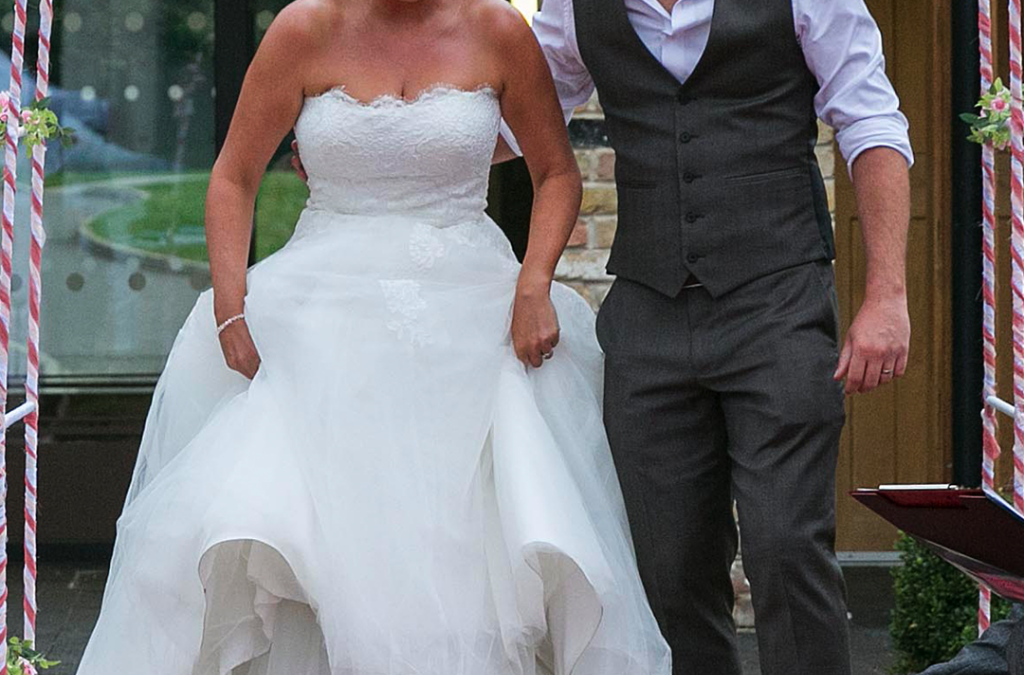
by Michael | Jun 9, 2015 | Blog
With times and trends moving so fast, it’s not always clear what wedding guests should and should not do nowadays. Here are a few rules to think about.
Invitations
Invitations may come by post or by e-mail these days, and it’s probably best to reply the same way. It is courtesy, to be frank, but it can also help the couple work out logistics, if all the replies come in the same form.
I don’t recommend giving an oral response (if you happen to meet the bride/groom out somewhere), as that can easily get overlooked.
It may be that only you are invited, but you have a plus-one. You may have to accept that the couple are limited for space/budget etc. And don’t assume your children are invited if they are not specifically mentioned. However, if you are engaged or married, then it’s fair enough to query it.
Social Media & photography
There will be differing views about photographing the wedding ceremony. (I have written on this subject before.) The first basic rule, in my view, is that unless you are actively encouraged by the couple (eg offering a hashtag to use on all wedding photos), don’t post anything. You certainly should not be posting before the couple themselves have done so.
There may well be a professional photographer present. He will have been paid specifically by the bride and groom to do a job, and it’s unfair if guests get in his way and even spoil shots for the couple.
Presents
There’s still a lot to be said about a John Lewis list or registry, for example. It makes perfect sense that the couple receive what they actually want – and not in multiple quantities. If the gifts on the list are too dear, then I’d say it’s acceptable to give a cheque or gift vouchers.
If you insist on giving an unasked-for present, then include the receipt so it can be changed, if necessary.
Dress
One thing that has become acceptable as a guest is to wear white to a wedding. But not all-white. Something with white in it is fine, but it’s really not the thing to steal the bride’s thunder. You can even wear black these days, but ensure it doesn’t look too funereal. (Jewellery and choice of shoes can lighten the effect.)
Ceremony and reception
Unless specifically stated otherwise, the invitation will be for the ceremony and reception (and not one or the other). You may not like church weddings, say, but that’s not an excuse to miss it. The couple will want you for the whole experience, so it would be rude to duck out. If it is important for the couple, it should be worth putting up with on your part.
Don’t think nobody will notice, either!
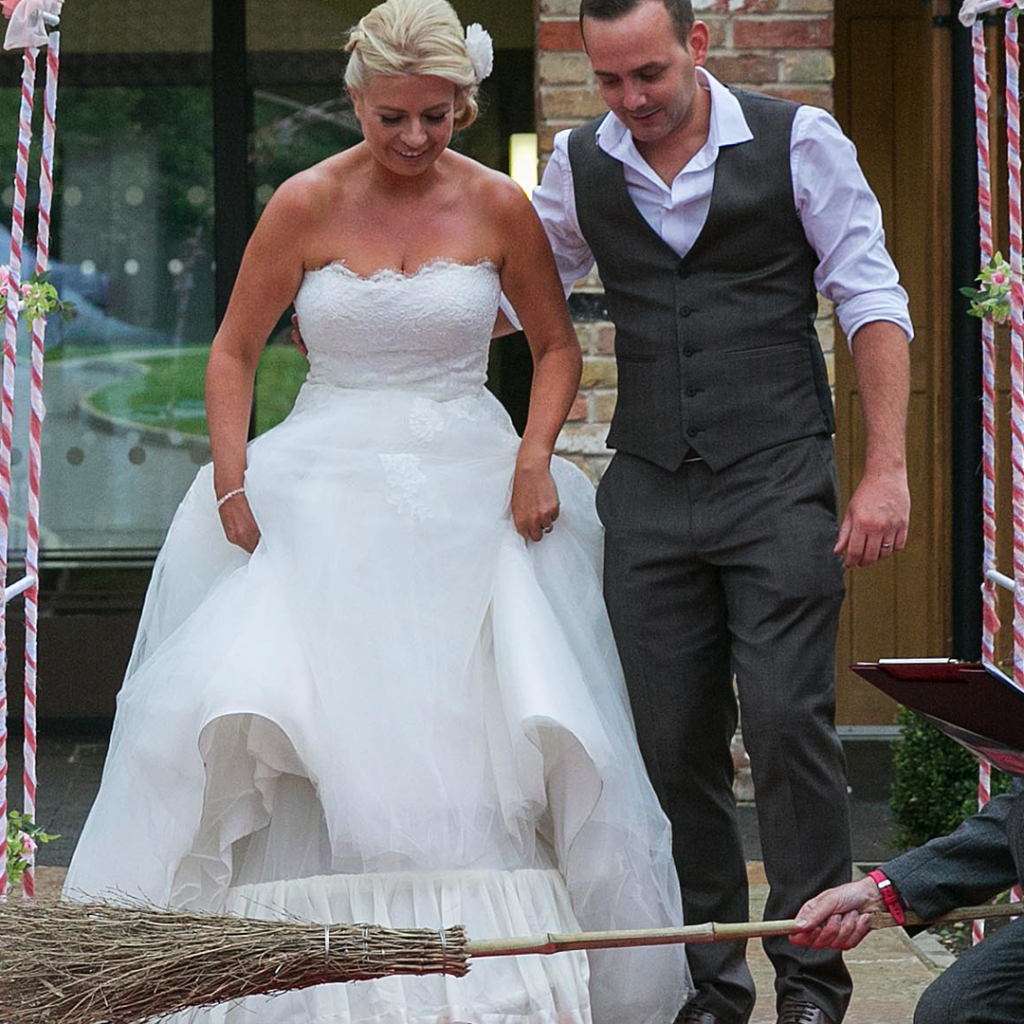
Participation
Whatever your views about wedding traditions, if the couple want to include some, respect this. It is their big day, after all, rather than yours. Excuse yourself quietly, if you really can’t stomach it.
Of course, if the wedding is civil celebrant-led, then don’t expect the orthodox, but have an open mind and enjoy!
There’s no reason why you can’t appreciate the wedding ceremony and reception as a guest. Most guests do so without the need to offend anybody. The key thing, whatever your feelings, is to remember whose day it really is.








